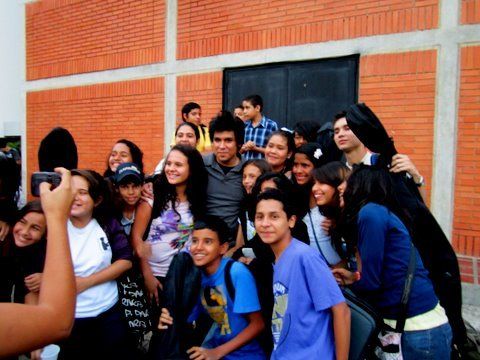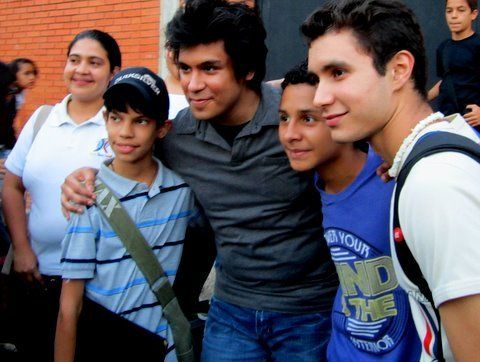El Sistema orchestras in Venezuela excel in many aspects, yet one of their most remarkable collective triumphs is their relentless work ethic. This week, I worked with the Orquesta Sinfonica Juvenil Franco Medina on Tchaikovsky’s Fifth Symphony. It was a four hour rehearsal. After we had become acclimated with each other I asked, when it would be appropriate to have a short break. They all said, “we don’t need a break, let’s keep going.”
This group is usually composed of musicians ages ranging thirteen to fifteen. They have come out of El Sistema Lara’s systematic approach to graduated orchestral instruction (this is the fourth orchestra in the program’s through line). Their ability to embrace musical goals with utmost diligence and curiosity is part of what makes their sound come alive so readily. It is how they advance so quickly, from arrangements of Marche Slave to Mahler Symphonies, in just a few years.
At this stage, they already understand the culture of playing in an orchestra, the aesthetics of sound; and they are also very focused on learning repertoire, quickly, at a much faster rate than their predecessors. This is why it isn’t surprising to see children’s orchestras playing complete Mahler symphonies in Caracas. The system has produced a long lineage of best practices and tools for talent development.
Learning is happening at a dramatic pace, because the children have insightful role models to look up to. The artistic prowess of El Sistema is carefully documented, young people can see and hear on YouTube what the Teresa Carreno Youth Orchestra (the most advanced high school age ensemble) is playing and how they are playing it. In Barquisimeto, while playing Marquez’s Danzon No. 2, many young violinists even emulate the motions of Lila Vivas (the orchestra’s concertmaster) as they go through the piece.
Here, I met an extremely gifted musician, who is learning to conduct the repertoire of his own children’s orchestra by watching other conductors work on the same repertoire with similar orchestras around the country. “I take the scores and conduct while the video plays, that’s how I can learn the music, says Jose Victor, a twelve-year-old horn player. Even during our rehearsal, it was easier to describe a specific bowing and articulation of sound, by pointing out directly to a certain viral performance by the Orquesta Infantil de Caracas.
Every musician in El Sistema is connected, they are all growing together. They all aspire together.
And that culture of aspiration manifests in many different ways. Motivation is key. It is part of the ethos of El Sistema. Frank Enrique, a clarinet player at my rehearsal, travels from Tamaca to Barquisimeto every day to attend his orchestra sessions. On a good day, it may take about two hours, each way. He is learning Shostakovich’s tenth symphony, it is a part of a major audition, leading to his dream of playing in of Caracas’ finest youth orchestras. Not everyone is centered on these artistic goals, many are here because they just “want to make new friends.”
A careful balance of both intrinsic and extrinsic motivation is part of the ingredients of their unyielding work ethic. In El Sistema, there are very clear artistic objectives in place. It is part of a goal setting theory where a level of success is achieved on a daily basis.
As we worked on the Tchaikovsky, we centered on building a musical narrative built on a variety of moods. Tempo changes had to be worked out between sections, but most importantly, the emotional aspects of the episodes had to be realized through a sense of collective understanding of a feeling for the music. We didn’t focus as much on having a technically perfect performance. That will come, with time. The main idea is to create a space of creative immersion and tap on the student’s potential for collaboration.
In El Sistema, there are no limits to the music-making, because peer-to-peer relationships developed in and through the orchestra take on multiple meanings and hence, artistic form. The music becomes larger than life. Individual skills are refined purposefully, for the benefit of the collective whole. The orchestra is the great motivator.
Because El Sistema has been built upon an upward spiral of motivation, student’s work with tenacious commitment. There are many different layers of goal setting embedded in the El sistema culture. Everyone: students, teachers, and the community at large, has a particular role and part to play. In the end, every performance is a manifestation of something that is much larger than the music itself. There are no other special ingredient here. It is hard work, that drives such extraordinary artistic achievements.


A short clip from our rehearsals this week.
This group is usually composed of musicians ages ranging thirteen to fifteen. They have come out of El Sistema Lara’s systematic approach to graduated orchestral instruction (this is the fourth orchestra in the program’s through line). Their ability to embrace musical goals with utmost diligence and curiosity is part of what makes their sound come alive so readily. It is how they advance so quickly, from arrangements of Marche Slave to Mahler Symphonies, in just a few years.
At this stage, they already understand the culture of playing in an orchestra, the aesthetics of sound; and they are also very focused on learning repertoire, quickly, at a much faster rate than their predecessors. This is why it isn’t surprising to see children’s orchestras playing complete Mahler symphonies in Caracas. The system has produced a long lineage of best practices and tools for talent development.
Learning is happening at a dramatic pace, because the children have insightful role models to look up to. The artistic prowess of El Sistema is carefully documented, young people can see and hear on YouTube what the Teresa Carreno Youth Orchestra (the most advanced high school age ensemble) is playing and how they are playing it. In Barquisimeto, while playing Marquez’s Danzon No. 2, many young violinists even emulate the motions of Lila Vivas (the orchestra’s concertmaster) as they go through the piece.
Here, I met an extremely gifted musician, who is learning to conduct the repertoire of his own children’s orchestra by watching other conductors work on the same repertoire with similar orchestras around the country. “I take the scores and conduct while the video plays, that’s how I can learn the music, says Jose Victor, a twelve-year-old horn player. Even during our rehearsal, it was easier to describe a specific bowing and articulation of sound, by pointing out directly to a certain viral performance by the Orquesta Infantil de Caracas.
Every musician in El Sistema is connected, they are all growing together. They all aspire together.
And that culture of aspiration manifests in many different ways. Motivation is key. It is part of the ethos of El Sistema. Frank Enrique, a clarinet player at my rehearsal, travels from Tamaca to Barquisimeto every day to attend his orchestra sessions. On a good day, it may take about two hours, each way. He is learning Shostakovich’s tenth symphony, it is a part of a major audition, leading to his dream of playing in of Caracas’ finest youth orchestras. Not everyone is centered on these artistic goals, many are here because they just “want to make new friends.”
A careful balance of both intrinsic and extrinsic motivation is part of the ingredients of their unyielding work ethic. In El Sistema, there are very clear artistic objectives in place. It is part of a goal setting theory where a level of success is achieved on a daily basis.
As we worked on the Tchaikovsky, we centered on building a musical narrative built on a variety of moods. Tempo changes had to be worked out between sections, but most importantly, the emotional aspects of the episodes had to be realized through a sense of collective understanding of a feeling for the music. We didn’t focus as much on having a technically perfect performance. That will come, with time. The main idea is to create a space of creative immersion and tap on the student’s potential for collaboration.
In El Sistema, there are no limits to the music-making, because peer-to-peer relationships developed in and through the orchestra take on multiple meanings and hence, artistic form. The music becomes larger than life. Individual skills are refined purposefully, for the benefit of the collective whole. The orchestra is the great motivator.
Because El Sistema has been built upon an upward spiral of motivation, student’s work with tenacious commitment. There are many different layers of goal setting embedded in the El sistema culture. Everyone: students, teachers, and the community at large, has a particular role and part to play. In the end, every performance is a manifestation of something that is much larger than the music itself. There are no other special ingredient here. It is hard work, that drives such extraordinary artistic achievements.


A short clip from our rehearsals this week.


